Organizational Behaviour at BBC: A Comprehensive Report
VerifiedAdded on 2020/06/03
|11
|4262
|53
Report
AI Summary
This report analyzes the organizational behavior of the British Broadcasting Corporation (BBC), examining its historical cultural shifts and current practices. It begins by exploring BBC's past adherence to a power culture, as defined by Handy's cultural typology, and its negative impacts on employee motivation and workplace dynamics, including discrimination issues. The report then delves into various motivation theories, including content theories (Maslow's Hierarchy, Herzberg's Two-Factor, McClelland) and process theories (Reinforcement, Expectancy, Equity), and their application in improving team effectiveness. It highlights the benefits of using these theories, such as enhanced employee dedication, improved work quality, and a healthier work environment. The report concludes by emphasizing the contribution of improved motivation levels in achieving organizational goals, leading to increased productivity, commitment, and overall business value for BBC. The report emphasizes the importance of employee satisfaction and involvement in decision-making for achieving organizational success.
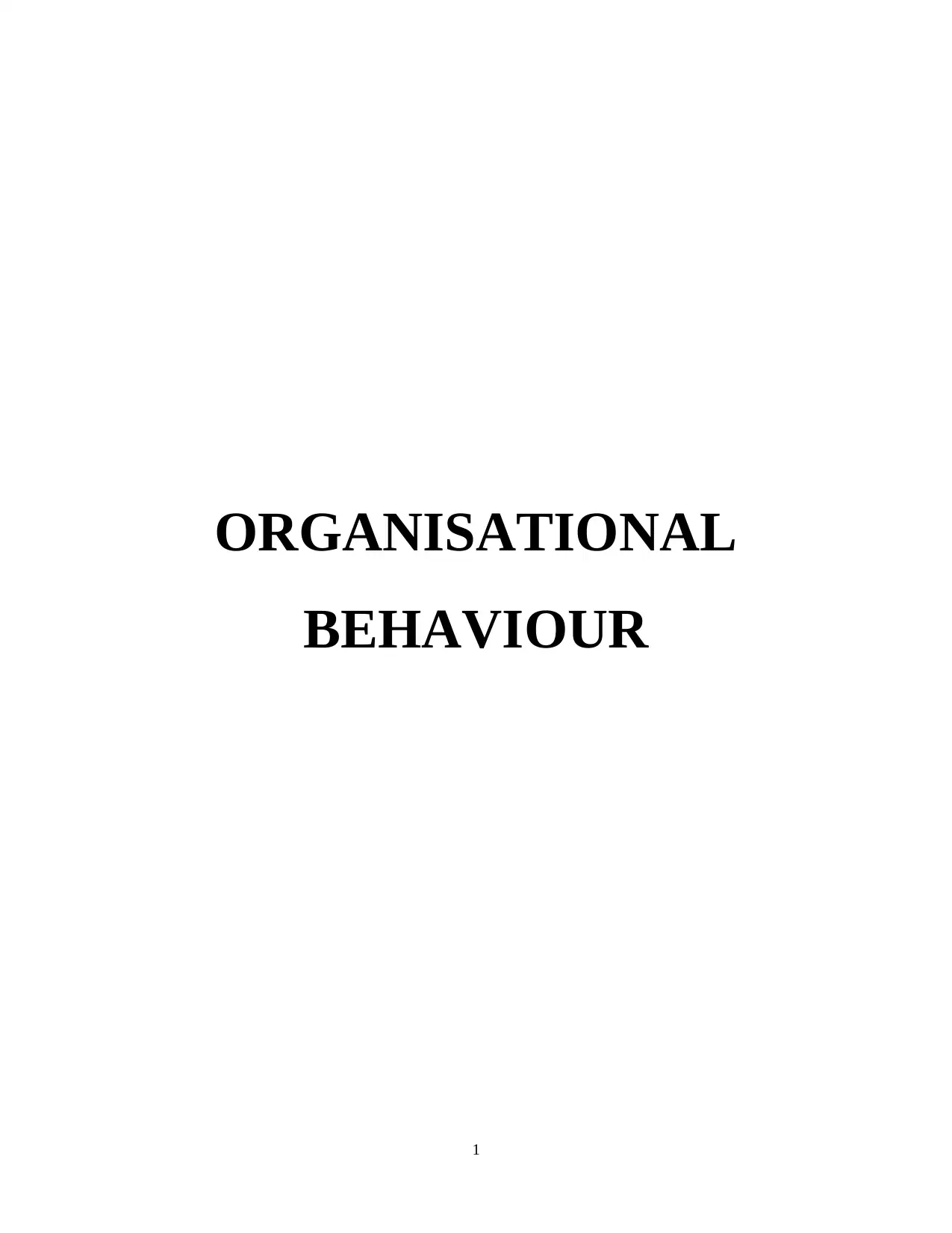
ORGANISATIONAL
BEHAVIOUR
1
BEHAVIOUR
1
Paraphrase This Document
Need a fresh take? Get an instant paraphrase of this document with our AI Paraphraser
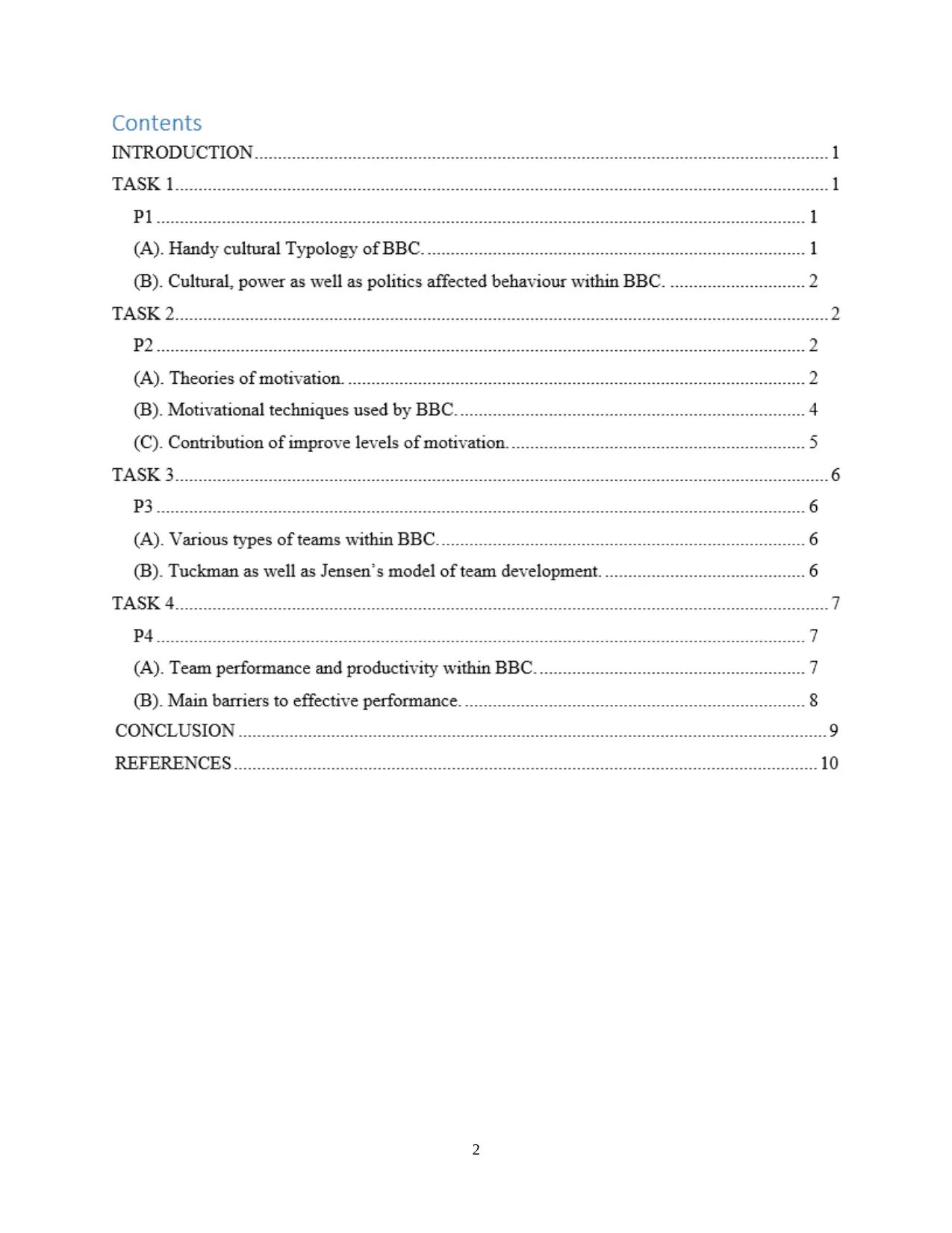
2
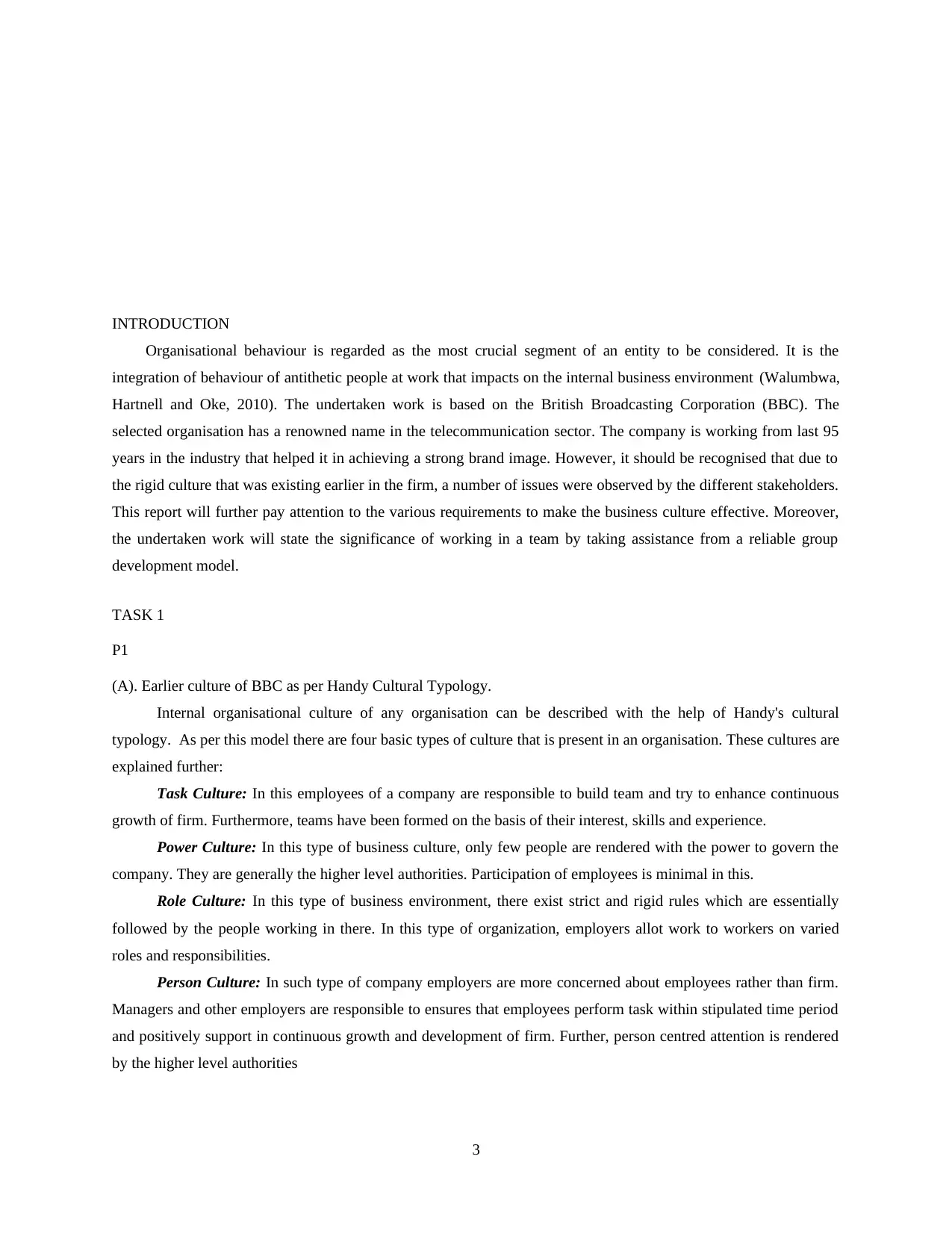
INTRODUCTION
Organisational behaviour is regarded as the most crucial segment of an entity to be considered. It is the
integration of behaviour of antithetic people at work that impacts on the internal business environment (Walumbwa,
Hartnell and Oke, 2010). The undertaken work is based on the British Broadcasting Corporation (BBC). The
selected organisation has a renowned name in the telecommunication sector. The company is working from last 95
years in the industry that helped it in achieving a strong brand image. However, it should be recognised that due to
the rigid culture that was existing earlier in the firm, a number of issues were observed by the different stakeholders.
This report will further pay attention to the various requirements to make the business culture effective. Moreover,
the undertaken work will state the significance of working in a team by taking assistance from a reliable group
development model.
TASK 1
P1
(A). Earlier culture of BBC as per Handy Cultural Typology.
Internal organisational culture of any organisation can be described with the help of Handy's cultural
typology. As per this model there are four basic types of culture that is present in an organisation. These cultures are
explained further:
Task Culture: In this employees of a company are responsible to build team and try to enhance continuous
growth of firm. Furthermore, teams have been formed on the basis of their interest, skills and experience.
Power Culture: In this type of business culture, only few people are rendered with the power to govern the
company. They are generally the higher level authorities. Participation of employees is minimal in this.
Role Culture: In this type of business environment, there exist strict and rigid rules which are essentially
followed by the people working in there. In this type of organization, employers allot work to workers on varied
roles and responsibilities.
Person Culture: In such type of company employers are more concerned about employees rather than firm.
Managers and other employers are responsible to ensures that employees perform task within stipulated time period
and positively support in continuous growth and development of firm. Further, person centred attention is rendered
by the higher level authorities
3
Organisational behaviour is regarded as the most crucial segment of an entity to be considered. It is the
integration of behaviour of antithetic people at work that impacts on the internal business environment (Walumbwa,
Hartnell and Oke, 2010). The undertaken work is based on the British Broadcasting Corporation (BBC). The
selected organisation has a renowned name in the telecommunication sector. The company is working from last 95
years in the industry that helped it in achieving a strong brand image. However, it should be recognised that due to
the rigid culture that was existing earlier in the firm, a number of issues were observed by the different stakeholders.
This report will further pay attention to the various requirements to make the business culture effective. Moreover,
the undertaken work will state the significance of working in a team by taking assistance from a reliable group
development model.
TASK 1
P1
(A). Earlier culture of BBC as per Handy Cultural Typology.
Internal organisational culture of any organisation can be described with the help of Handy's cultural
typology. As per this model there are four basic types of culture that is present in an organisation. These cultures are
explained further:
Task Culture: In this employees of a company are responsible to build team and try to enhance continuous
growth of firm. Furthermore, teams have been formed on the basis of their interest, skills and experience.
Power Culture: In this type of business culture, only few people are rendered with the power to govern the
company. They are generally the higher level authorities. Participation of employees is minimal in this.
Role Culture: In this type of business environment, there exist strict and rigid rules which are essentially
followed by the people working in there. In this type of organization, employers allot work to workers on varied
roles and responsibilities.
Person Culture: In such type of company employers are more concerned about employees rather than firm.
Managers and other employers are responsible to ensures that employees perform task within stipulated time period
and positively support in continuous growth and development of firm. Further, person centred attention is rendered
by the higher level authorities
3
⊘ This is a preview!⊘
Do you want full access?
Subscribe today to unlock all pages.

Trusted by 1+ million students worldwide
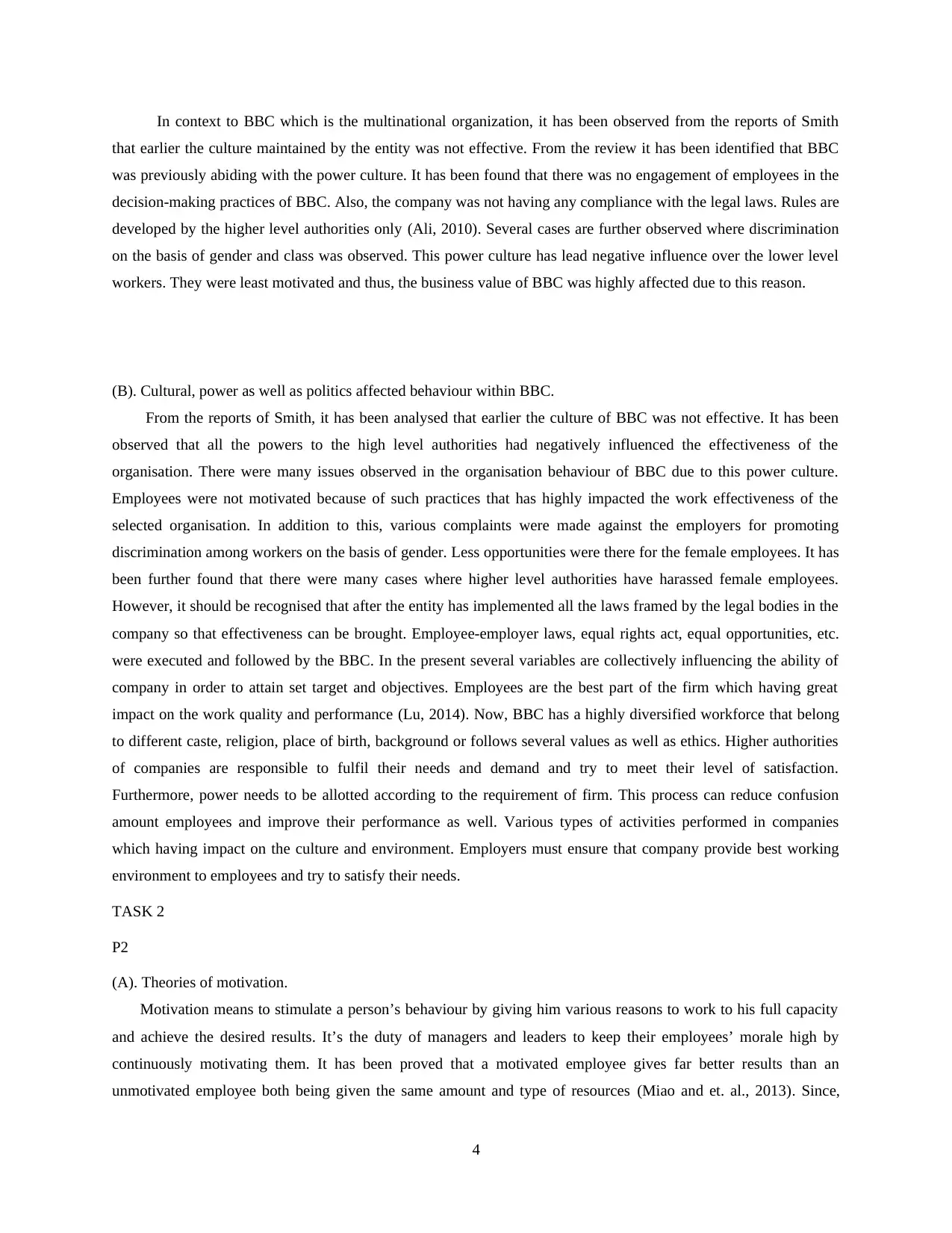
In context to BBC which is the multinational organization, it has been observed from the reports of Smith
that earlier the culture maintained by the entity was not effective. From the review it has been identified that BBC
was previously abiding with the power culture. It has been found that there was no engagement of employees in the
decision-making practices of BBC. Also, the company was not having any compliance with the legal laws. Rules are
developed by the higher level authorities only (Ali, 2010). Several cases are further observed where discrimination
on the basis of gender and class was observed. This power culture has lead negative influence over the lower level
workers. They were least motivated and thus, the business value of BBC was highly affected due to this reason.
(B). Cultural, power as well as politics affected behaviour within BBC.
From the reports of Smith, it has been analysed that earlier the culture of BBC was not effective. It has been
observed that all the powers to the high level authorities had negatively influenced the effectiveness of the
organisation. There were many issues observed in the organisation behaviour of BBC due to this power culture.
Employees were not motivated because of such practices that has highly impacted the work effectiveness of the
selected organisation. In addition to this, various complaints were made against the employers for promoting
discrimination among workers on the basis of gender. Less opportunities were there for the female employees. It has
been further found that there were many cases where higher level authorities have harassed female employees.
However, it should be recognised that after the entity has implemented all the laws framed by the legal bodies in the
company so that effectiveness can be brought. Employee-employer laws, equal rights act, equal opportunities, etc.
were executed and followed by the BBC. In the present several variables are collectively influencing the ability of
company in order to attain set target and objectives. Employees are the best part of the firm which having great
impact on the work quality and performance (Lu, 2014). Now, BBC has a highly diversified workforce that belong
to different caste, religion, place of birth, background or follows several values as well as ethics. Higher authorities
of companies are responsible to fulfil their needs and demand and try to meet their level of satisfaction.
Furthermore, power needs to be allotted according to the requirement of firm. This process can reduce confusion
amount employees and improve their performance as well. Various types of activities performed in companies
which having impact on the culture and environment. Employers must ensure that company provide best working
environment to employees and try to satisfy their needs.
TASK 2
P2
(A). Theories of motivation.
Motivation means to stimulate a person’s behaviour by giving him various reasons to work to his full capacity
and achieve the desired results. It’s the duty of managers and leaders to keep their employees’ morale high by
continuously motivating them. It has been proved that a motivated employee gives far better results than an
unmotivated employee both being given the same amount and type of resources (Miao and et. al., 2013). Since,
4
that earlier the culture maintained by the entity was not effective. From the review it has been identified that BBC
was previously abiding with the power culture. It has been found that there was no engagement of employees in the
decision-making practices of BBC. Also, the company was not having any compliance with the legal laws. Rules are
developed by the higher level authorities only (Ali, 2010). Several cases are further observed where discrimination
on the basis of gender and class was observed. This power culture has lead negative influence over the lower level
workers. They were least motivated and thus, the business value of BBC was highly affected due to this reason.
(B). Cultural, power as well as politics affected behaviour within BBC.
From the reports of Smith, it has been analysed that earlier the culture of BBC was not effective. It has been
observed that all the powers to the high level authorities had negatively influenced the effectiveness of the
organisation. There were many issues observed in the organisation behaviour of BBC due to this power culture.
Employees were not motivated because of such practices that has highly impacted the work effectiveness of the
selected organisation. In addition to this, various complaints were made against the employers for promoting
discrimination among workers on the basis of gender. Less opportunities were there for the female employees. It has
been further found that there were many cases where higher level authorities have harassed female employees.
However, it should be recognised that after the entity has implemented all the laws framed by the legal bodies in the
company so that effectiveness can be brought. Employee-employer laws, equal rights act, equal opportunities, etc.
were executed and followed by the BBC. In the present several variables are collectively influencing the ability of
company in order to attain set target and objectives. Employees are the best part of the firm which having great
impact on the work quality and performance (Lu, 2014). Now, BBC has a highly diversified workforce that belong
to different caste, religion, place of birth, background or follows several values as well as ethics. Higher authorities
of companies are responsible to fulfil their needs and demand and try to meet their level of satisfaction.
Furthermore, power needs to be allotted according to the requirement of firm. This process can reduce confusion
amount employees and improve their performance as well. Various types of activities performed in companies
which having impact on the culture and environment. Employers must ensure that company provide best working
environment to employees and try to satisfy their needs.
TASK 2
P2
(A). Theories of motivation.
Motivation means to stimulate a person’s behaviour by giving him various reasons to work to his full capacity
and achieve the desired results. It’s the duty of managers and leaders to keep their employees’ morale high by
continuously motivating them. It has been proved that a motivated employee gives far better results than an
unmotivated employee both being given the same amount and type of resources (Miao and et. al., 2013). Since,
4
Paraphrase This Document
Need a fresh take? Get an instant paraphrase of this document with our AI Paraphraser
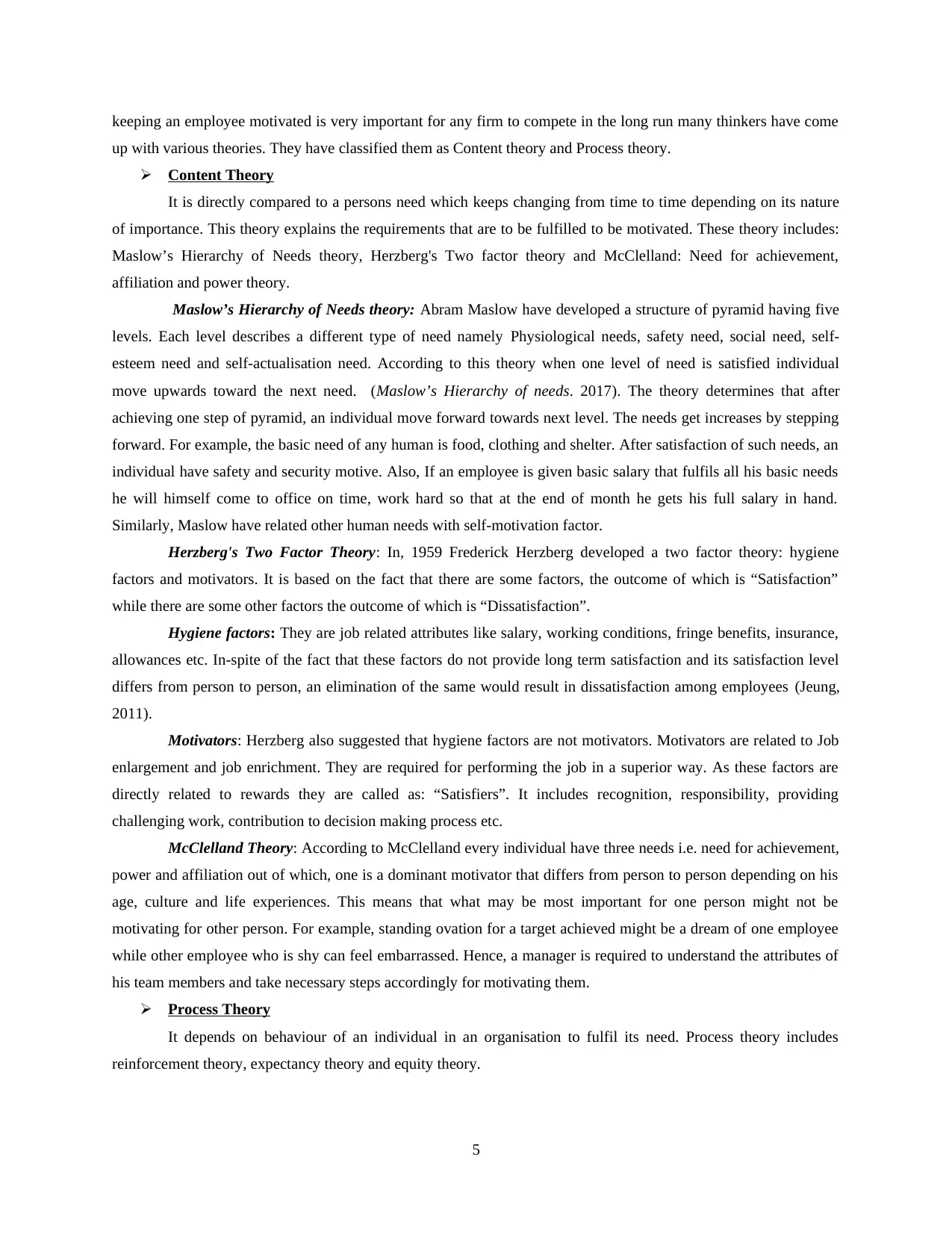
keeping an employee motivated is very important for any firm to compete in the long run many thinkers have come
up with various theories. They have classified them as Content theory and Process theory.
Content Theory
It is directly compared to a persons need which keeps changing from time to time depending on its nature
of importance. This theory explains the requirements that are to be fulfilled to be motivated. These theory includes:
Maslow’s Hierarchy of Needs theory, Herzberg's Two factor theory and McClelland: Need for achievement,
affiliation and power theory.
Maslow’s Hierarchy of Needs theory: Abram Maslow have developed a structure of pyramid having five
levels. Each level describes a different type of need namely Physiological needs, safety need, social need, self-
esteem need and self-actualisation need. According to this theory when one level of need is satisfied individual
move upwards toward the next need. (Maslow’s Hierarchy of needs. 2017). The theory determines that after
achieving one step of pyramid, an individual move forward towards next level. The needs get increases by stepping
forward. For example, the basic need of any human is food, clothing and shelter. After satisfaction of such needs, an
individual have safety and security motive. Also, If an employee is given basic salary that fulfils all his basic needs
he will himself come to office on time, work hard so that at the end of month he gets his full salary in hand.
Similarly, Maslow have related other human needs with self-motivation factor.
Herzberg's Two Factor Theory: In, 1959 Frederick Herzberg developed a two factor theory: hygiene
factors and motivators. It is based on the fact that there are some factors, the outcome of which is “Satisfaction”
while there are some other factors the outcome of which is “Dissatisfaction”.
Hygiene factors: They are job related attributes like salary, working conditions, fringe benefits, insurance,
allowances etc. In-spite of the fact that these factors do not provide long term satisfaction and its satisfaction level
differs from person to person, an elimination of the same would result in dissatisfaction among employees (Jeung,
2011).
Motivators: Herzberg also suggested that hygiene factors are not motivators. Motivators are related to Job
enlargement and job enrichment. They are required for performing the job in a superior way. As these factors are
directly related to rewards they are called as: “Satisfiers”. It includes recognition, responsibility, providing
challenging work, contribution to decision making process etc.
McClelland Theory: According to McClelland every individual have three needs i.e. need for achievement,
power and affiliation out of which, one is a dominant motivator that differs from person to person depending on his
age, culture and life experiences. This means that what may be most important for one person might not be
motivating for other person. For example, standing ovation for a target achieved might be a dream of one employee
while other employee who is shy can feel embarrassed. Hence, a manager is required to understand the attributes of
his team members and take necessary steps accordingly for motivating them.
Process Theory
It depends on behaviour of an individual in an organisation to fulfil its need. Process theory includes
reinforcement theory, expectancy theory and equity theory.
5
up with various theories. They have classified them as Content theory and Process theory.
Content Theory
It is directly compared to a persons need which keeps changing from time to time depending on its nature
of importance. This theory explains the requirements that are to be fulfilled to be motivated. These theory includes:
Maslow’s Hierarchy of Needs theory, Herzberg's Two factor theory and McClelland: Need for achievement,
affiliation and power theory.
Maslow’s Hierarchy of Needs theory: Abram Maslow have developed a structure of pyramid having five
levels. Each level describes a different type of need namely Physiological needs, safety need, social need, self-
esteem need and self-actualisation need. According to this theory when one level of need is satisfied individual
move upwards toward the next need. (Maslow’s Hierarchy of needs. 2017). The theory determines that after
achieving one step of pyramid, an individual move forward towards next level. The needs get increases by stepping
forward. For example, the basic need of any human is food, clothing and shelter. After satisfaction of such needs, an
individual have safety and security motive. Also, If an employee is given basic salary that fulfils all his basic needs
he will himself come to office on time, work hard so that at the end of month he gets his full salary in hand.
Similarly, Maslow have related other human needs with self-motivation factor.
Herzberg's Two Factor Theory: In, 1959 Frederick Herzberg developed a two factor theory: hygiene
factors and motivators. It is based on the fact that there are some factors, the outcome of which is “Satisfaction”
while there are some other factors the outcome of which is “Dissatisfaction”.
Hygiene factors: They are job related attributes like salary, working conditions, fringe benefits, insurance,
allowances etc. In-spite of the fact that these factors do not provide long term satisfaction and its satisfaction level
differs from person to person, an elimination of the same would result in dissatisfaction among employees (Jeung,
2011).
Motivators: Herzberg also suggested that hygiene factors are not motivators. Motivators are related to Job
enlargement and job enrichment. They are required for performing the job in a superior way. As these factors are
directly related to rewards they are called as: “Satisfiers”. It includes recognition, responsibility, providing
challenging work, contribution to decision making process etc.
McClelland Theory: According to McClelland every individual have three needs i.e. need for achievement,
power and affiliation out of which, one is a dominant motivator that differs from person to person depending on his
age, culture and life experiences. This means that what may be most important for one person might not be
motivating for other person. For example, standing ovation for a target achieved might be a dream of one employee
while other employee who is shy can feel embarrassed. Hence, a manager is required to understand the attributes of
his team members and take necessary steps accordingly for motivating them.
Process Theory
It depends on behaviour of an individual in an organisation to fulfil its need. Process theory includes
reinforcement theory, expectancy theory and equity theory.
5
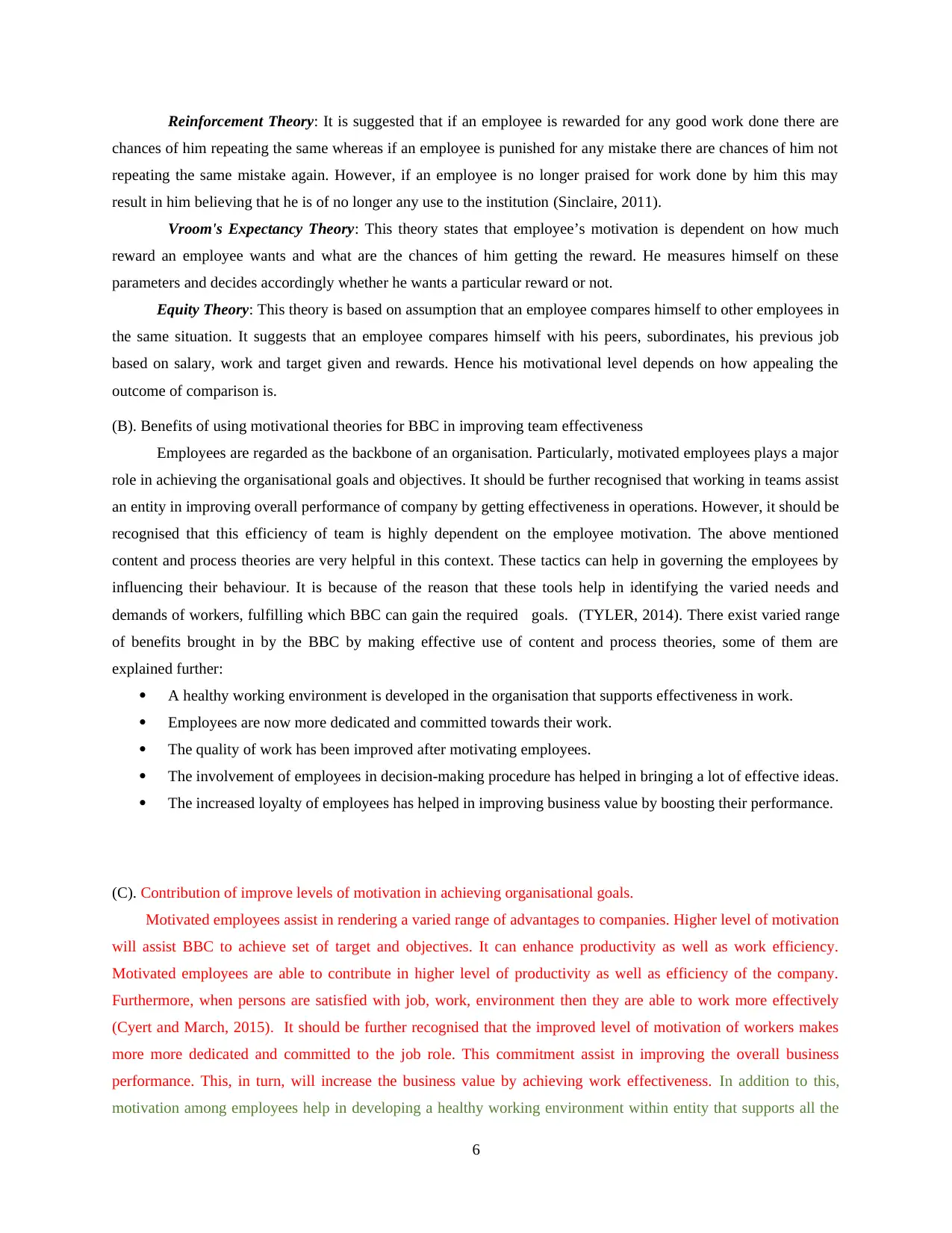
Reinforcement Theory: It is suggested that if an employee is rewarded for any good work done there are
chances of him repeating the same whereas if an employee is punished for any mistake there are chances of him not
repeating the same mistake again. However, if an employee is no longer praised for work done by him this may
result in him believing that he is of no longer any use to the institution (Sinclaire, 2011).
Vroom's Expectancy Theory: This theory states that employee’s motivation is dependent on how much
reward an employee wants and what are the chances of him getting the reward. He measures himself on these
parameters and decides accordingly whether he wants a particular reward or not.
Equity Theory: This theory is based on assumption that an employee compares himself to other employees in
the same situation. It suggests that an employee compares himself with his peers, subordinates, his previous job
based on salary, work and target given and rewards. Hence his motivational level depends on how appealing the
outcome of comparison is.
(B). Benefits of using motivational theories for BBC in improving team effectiveness
Employees are regarded as the backbone of an organisation. Particularly, motivated employees plays a major
role in achieving the organisational goals and objectives. It should be further recognised that working in teams assist
an entity in improving overall performance of company by getting effectiveness in operations. However, it should be
recognised that this efficiency of team is highly dependent on the employee motivation. The above mentioned
content and process theories are very helpful in this context. These tactics can help in governing the employees by
influencing their behaviour. It is because of the reason that these tools help in identifying the varied needs and
demands of workers, fulfilling which BBC can gain the required goals. (TYLER, 2014). There exist varied range
of benefits brought in by the BBC by making effective use of content and process theories, some of them are
explained further:
A healthy working environment is developed in the organisation that supports effectiveness in work.
Employees are now more dedicated and committed towards their work.
The quality of work has been improved after motivating employees.
The involvement of employees in decision-making procedure has helped in bringing a lot of effective ideas.
The increased loyalty of employees has helped in improving business value by boosting their performance.
(C). Contribution of improve levels of motivation in achieving organisational goals.
Motivated employees assist in rendering a varied range of advantages to companies. Higher level of motivation
will assist BBC to achieve set of target and objectives. It can enhance productivity as well as work efficiency.
Motivated employees are able to contribute in higher level of productivity as well as efficiency of the company.
Furthermore, when persons are satisfied with job, work, environment then they are able to work more effectively
(Cyert and March, 2015). It should be further recognised that the improved level of motivation of workers makes
more more dedicated and committed to the job role. This commitment assist in improving the overall business
performance. This, in turn, will increase the business value by achieving work effectiveness. In addition to this,
motivation among employees help in developing a healthy working environment within entity that supports all the
6
chances of him repeating the same whereas if an employee is punished for any mistake there are chances of him not
repeating the same mistake again. However, if an employee is no longer praised for work done by him this may
result in him believing that he is of no longer any use to the institution (Sinclaire, 2011).
Vroom's Expectancy Theory: This theory states that employee’s motivation is dependent on how much
reward an employee wants and what are the chances of him getting the reward. He measures himself on these
parameters and decides accordingly whether he wants a particular reward or not.
Equity Theory: This theory is based on assumption that an employee compares himself to other employees in
the same situation. It suggests that an employee compares himself with his peers, subordinates, his previous job
based on salary, work and target given and rewards. Hence his motivational level depends on how appealing the
outcome of comparison is.
(B). Benefits of using motivational theories for BBC in improving team effectiveness
Employees are regarded as the backbone of an organisation. Particularly, motivated employees plays a major
role in achieving the organisational goals and objectives. It should be further recognised that working in teams assist
an entity in improving overall performance of company by getting effectiveness in operations. However, it should be
recognised that this efficiency of team is highly dependent on the employee motivation. The above mentioned
content and process theories are very helpful in this context. These tactics can help in governing the employees by
influencing their behaviour. It is because of the reason that these tools help in identifying the varied needs and
demands of workers, fulfilling which BBC can gain the required goals. (TYLER, 2014). There exist varied range
of benefits brought in by the BBC by making effective use of content and process theories, some of them are
explained further:
A healthy working environment is developed in the organisation that supports effectiveness in work.
Employees are now more dedicated and committed towards their work.
The quality of work has been improved after motivating employees.
The involvement of employees in decision-making procedure has helped in bringing a lot of effective ideas.
The increased loyalty of employees has helped in improving business value by boosting their performance.
(C). Contribution of improve levels of motivation in achieving organisational goals.
Motivated employees assist in rendering a varied range of advantages to companies. Higher level of motivation
will assist BBC to achieve set of target and objectives. It can enhance productivity as well as work efficiency.
Motivated employees are able to contribute in higher level of productivity as well as efficiency of the company.
Furthermore, when persons are satisfied with job, work, environment then they are able to work more effectively
(Cyert and March, 2015). It should be further recognised that the improved level of motivation of workers makes
more more dedicated and committed to the job role. This commitment assist in improving the overall business
performance. This, in turn, will increase the business value by achieving work effectiveness. In addition to this,
motivation among employees help in developing a healthy working environment within entity that supports all the
6
⊘ This is a preview!⊘
Do you want full access?
Subscribe today to unlock all pages.

Trusted by 1+ million students worldwide
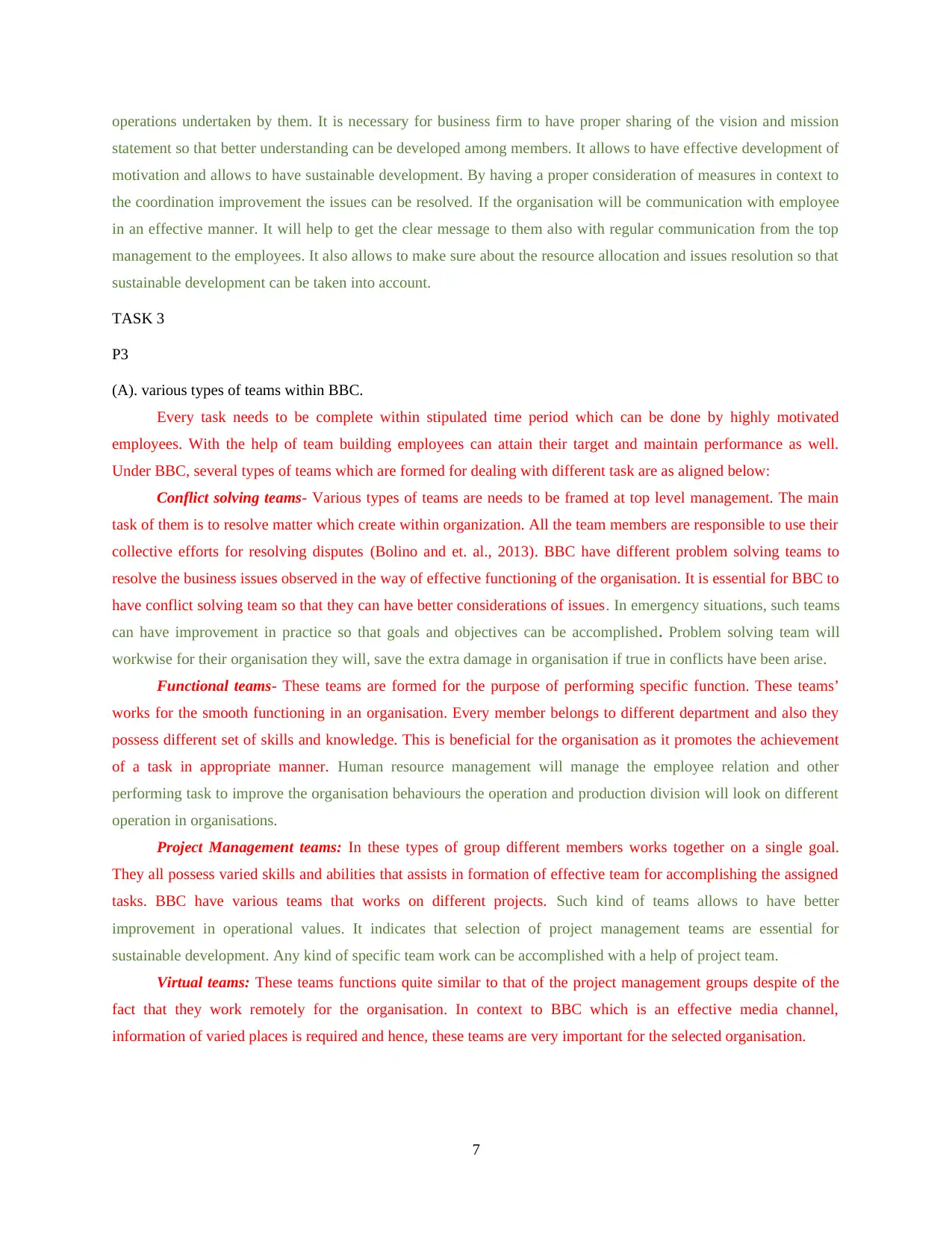
operations undertaken by them. It is necessary for business firm to have proper sharing of the vision and mission
statement so that better understanding can be developed among members. It allows to have effective development of
motivation and allows to have sustainable development. By having a proper consideration of measures in context to
the coordination improvement the issues can be resolved. If the organisation will be communication with employee
in an effective manner. It will help to get the clear message to them also with regular communication from the top
management to the employees. It also allows to make sure about the resource allocation and issues resolution so that
sustainable development can be taken into account.
TASK 3
P3
(A). various types of teams within BBC.
Every task needs to be complete within stipulated time period which can be done by highly motivated
employees. With the help of team building employees can attain their target and maintain performance as well.
Under BBC, several types of teams which are formed for dealing with different task are as aligned below:
Conflict solving teams- Various types of teams are needs to be framed at top level management. The main
task of them is to resolve matter which create within organization. All the team members are responsible to use their
collective efforts for resolving disputes (Bolino and et. al., 2013). BBC have different problem solving teams to
resolve the business issues observed in the way of effective functioning of the organisation. It is essential for BBC to
have conflict solving team so that they can have better considerations of issues. In emergency situations, such teams
can have improvement in practice so that goals and objectives can be accomplished. Problem solving team will
workwise for their organisation they will, save the extra damage in organisation if true in conflicts have been arise.
Functional teams- These teams are formed for the purpose of performing specific function. These teams’
works for the smooth functioning in an organisation. Every member belongs to different department and also they
possess different set of skills and knowledge. This is beneficial for the organisation as it promotes the achievement
of a task in appropriate manner. Human resource management will manage the employee relation and other
performing task to improve the organisation behaviours the operation and production division will look on different
operation in organisations.
Project Management teams: In these types of group different members works together on a single goal.
They all possess varied skills and abilities that assists in formation of effective team for accomplishing the assigned
tasks. BBC have various teams that works on different projects. Such kind of teams allows to have better
improvement in operational values. It indicates that selection of project management teams are essential for
sustainable development. Any kind of specific team work can be accomplished with a help of project team.
Virtual teams: These teams functions quite similar to that of the project management groups despite of the
fact that they work remotely for the organisation. In context to BBC which is an effective media channel,
information of varied places is required and hence, these teams are very important for the selected organisation.
7
statement so that better understanding can be developed among members. It allows to have effective development of
motivation and allows to have sustainable development. By having a proper consideration of measures in context to
the coordination improvement the issues can be resolved. If the organisation will be communication with employee
in an effective manner. It will help to get the clear message to them also with regular communication from the top
management to the employees. It also allows to make sure about the resource allocation and issues resolution so that
sustainable development can be taken into account.
TASK 3
P3
(A). various types of teams within BBC.
Every task needs to be complete within stipulated time period which can be done by highly motivated
employees. With the help of team building employees can attain their target and maintain performance as well.
Under BBC, several types of teams which are formed for dealing with different task are as aligned below:
Conflict solving teams- Various types of teams are needs to be framed at top level management. The main
task of them is to resolve matter which create within organization. All the team members are responsible to use their
collective efforts for resolving disputes (Bolino and et. al., 2013). BBC have different problem solving teams to
resolve the business issues observed in the way of effective functioning of the organisation. It is essential for BBC to
have conflict solving team so that they can have better considerations of issues. In emergency situations, such teams
can have improvement in practice so that goals and objectives can be accomplished. Problem solving team will
workwise for their organisation they will, save the extra damage in organisation if true in conflicts have been arise.
Functional teams- These teams are formed for the purpose of performing specific function. These teams’
works for the smooth functioning in an organisation. Every member belongs to different department and also they
possess different set of skills and knowledge. This is beneficial for the organisation as it promotes the achievement
of a task in appropriate manner. Human resource management will manage the employee relation and other
performing task to improve the organisation behaviours the operation and production division will look on different
operation in organisations.
Project Management teams: In these types of group different members works together on a single goal.
They all possess varied skills and abilities that assists in formation of effective team for accomplishing the assigned
tasks. BBC have various teams that works on different projects. Such kind of teams allows to have better
improvement in operational values. It indicates that selection of project management teams are essential for
sustainable development. Any kind of specific team work can be accomplished with a help of project team.
Virtual teams: These teams functions quite similar to that of the project management groups despite of the
fact that they work remotely for the organisation. In context to BBC which is an effective media channel,
information of varied places is required and hence, these teams are very important for the selected organisation.
7
Paraphrase This Document
Need a fresh take? Get an instant paraphrase of this document with our AI Paraphraser
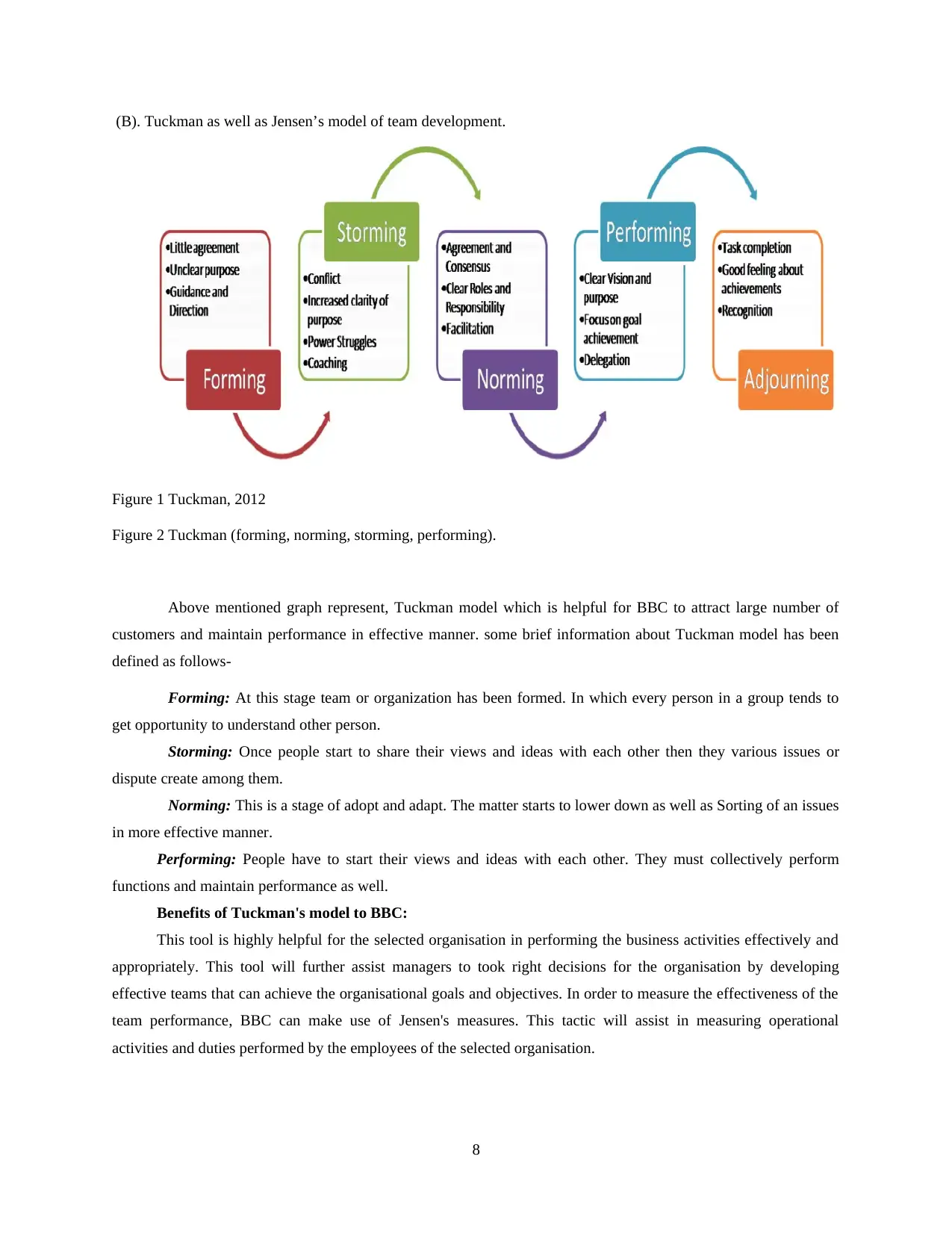
(B). Tuckman as well as Jensen’s model of team development.
Figure 1 Tuckman, 2012
Figure 2 Tuckman (forming, norming, storming, performing).
Above mentioned graph represent, Tuckman model which is helpful for BBC to attract large number of
customers and maintain performance in effective manner. some brief information about Tuckman model has been
defined as follows-
Forming: At this stage team or organization has been formed. In which every person in a group tends to
get opportunity to understand other person.
Storming: Once people start to share their views and ideas with each other then they various issues or
dispute create among them.
Norming: This is a stage of adopt and adapt. The matter starts to lower down as well as Sorting of an issues
in more effective manner.
Performing: People have to start their views and ideas with each other. They must collectively perform
functions and maintain performance as well.
Benefits of Tuckman's model to BBC:
This tool is highly helpful for the selected organisation in performing the business activities effectively and
appropriately. This tool will further assist managers to took right decisions for the organisation by developing
effective teams that can achieve the organisational goals and objectives. In order to measure the effectiveness of the
team performance, BBC can make use of Jensen's measures. This tactic will assist in measuring operational
activities and duties performed by the employees of the selected organisation.
8
Figure 1 Tuckman, 2012
Figure 2 Tuckman (forming, norming, storming, performing).
Above mentioned graph represent, Tuckman model which is helpful for BBC to attract large number of
customers and maintain performance in effective manner. some brief information about Tuckman model has been
defined as follows-
Forming: At this stage team or organization has been formed. In which every person in a group tends to
get opportunity to understand other person.
Storming: Once people start to share their views and ideas with each other then they various issues or
dispute create among them.
Norming: This is a stage of adopt and adapt. The matter starts to lower down as well as Sorting of an issues
in more effective manner.
Performing: People have to start their views and ideas with each other. They must collectively perform
functions and maintain performance as well.
Benefits of Tuckman's model to BBC:
This tool is highly helpful for the selected organisation in performing the business activities effectively and
appropriately. This tool will further assist managers to took right decisions for the organisation by developing
effective teams that can achieve the organisational goals and objectives. In order to measure the effectiveness of the
team performance, BBC can make use of Jensen's measures. This tactic will assist in measuring operational
activities and duties performed by the employees of the selected organisation.
8
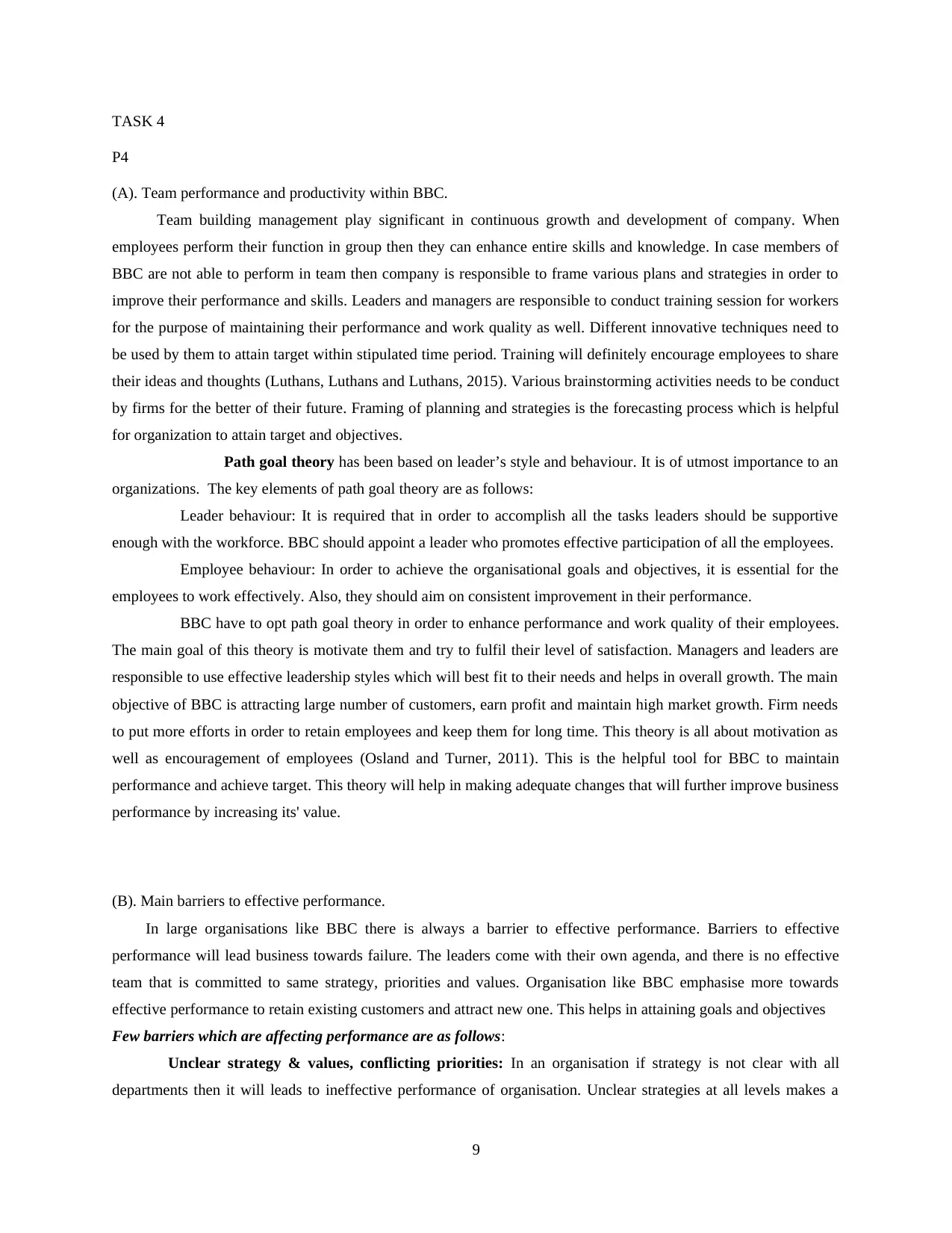
TASK 4
P4
(A). Team performance and productivity within BBC.
Team building management play significant in continuous growth and development of company. When
employees perform their function in group then they can enhance entire skills and knowledge. In case members of
BBC are not able to perform in team then company is responsible to frame various plans and strategies in order to
improve their performance and skills. Leaders and managers are responsible to conduct training session for workers
for the purpose of maintaining their performance and work quality as well. Different innovative techniques need to
be used by them to attain target within stipulated time period. Training will definitely encourage employees to share
their ideas and thoughts (Luthans, Luthans and Luthans, 2015). Various brainstorming activities needs to be conduct
by firms for the better of their future. Framing of planning and strategies is the forecasting process which is helpful
for organization to attain target and objectives.
Path goal theory has been based on leader’s style and behaviour. It is of utmost importance to an
organizations. The key elements of path goal theory are as follows:
Leader behaviour: It is required that in order to accomplish all the tasks leaders should be supportive
enough with the workforce. BBC should appoint a leader who promotes effective participation of all the employees.
Employee behaviour: In order to achieve the organisational goals and objectives, it is essential for the
employees to work effectively. Also, they should aim on consistent improvement in their performance.
BBC have to opt path goal theory in order to enhance performance and work quality of their employees.
The main goal of this theory is motivate them and try to fulfil their level of satisfaction. Managers and leaders are
responsible to use effective leadership styles which will best fit to their needs and helps in overall growth. The main
objective of BBC is attracting large number of customers, earn profit and maintain high market growth. Firm needs
to put more efforts in order to retain employees and keep them for long time. This theory is all about motivation as
well as encouragement of employees (Osland and Turner, 2011). This is the helpful tool for BBC to maintain
performance and achieve target. This theory will help in making adequate changes that will further improve business
performance by increasing its' value.
(B). Main barriers to effective performance.
In large organisations like BBC there is always a barrier to effective performance. Barriers to effective
performance will lead business towards failure. The leaders come with their own agenda, and there is no effective
team that is committed to same strategy, priorities and values. Organisation like BBC emphasise more towards
effective performance to retain existing customers and attract new one. This helps in attaining goals and objectives
Few barriers which are affecting performance are as follows:
Unclear strategy & values, conflicting priorities: In an organisation if strategy is not clear with all
departments then it will leads to ineffective performance of organisation. Unclear strategies at all levels makes a
9
P4
(A). Team performance and productivity within BBC.
Team building management play significant in continuous growth and development of company. When
employees perform their function in group then they can enhance entire skills and knowledge. In case members of
BBC are not able to perform in team then company is responsible to frame various plans and strategies in order to
improve their performance and skills. Leaders and managers are responsible to conduct training session for workers
for the purpose of maintaining their performance and work quality as well. Different innovative techniques need to
be used by them to attain target within stipulated time period. Training will definitely encourage employees to share
their ideas and thoughts (Luthans, Luthans and Luthans, 2015). Various brainstorming activities needs to be conduct
by firms for the better of their future. Framing of planning and strategies is the forecasting process which is helpful
for organization to attain target and objectives.
Path goal theory has been based on leader’s style and behaviour. It is of utmost importance to an
organizations. The key elements of path goal theory are as follows:
Leader behaviour: It is required that in order to accomplish all the tasks leaders should be supportive
enough with the workforce. BBC should appoint a leader who promotes effective participation of all the employees.
Employee behaviour: In order to achieve the organisational goals and objectives, it is essential for the
employees to work effectively. Also, they should aim on consistent improvement in their performance.
BBC have to opt path goal theory in order to enhance performance and work quality of their employees.
The main goal of this theory is motivate them and try to fulfil their level of satisfaction. Managers and leaders are
responsible to use effective leadership styles which will best fit to their needs and helps in overall growth. The main
objective of BBC is attracting large number of customers, earn profit and maintain high market growth. Firm needs
to put more efforts in order to retain employees and keep them for long time. This theory is all about motivation as
well as encouragement of employees (Osland and Turner, 2011). This is the helpful tool for BBC to maintain
performance and achieve target. This theory will help in making adequate changes that will further improve business
performance by increasing its' value.
(B). Main barriers to effective performance.
In large organisations like BBC there is always a barrier to effective performance. Barriers to effective
performance will lead business towards failure. The leaders come with their own agenda, and there is no effective
team that is committed to same strategy, priorities and values. Organisation like BBC emphasise more towards
effective performance to retain existing customers and attract new one. This helps in attaining goals and objectives
Few barriers which are affecting performance are as follows:
Unclear strategy & values, conflicting priorities: In an organisation if strategy is not clear with all
departments then it will leads to ineffective performance of organisation. Unclear strategies at all levels makes a
9
⊘ This is a preview!⊘
Do you want full access?
Subscribe today to unlock all pages.

Trusted by 1+ million students worldwide
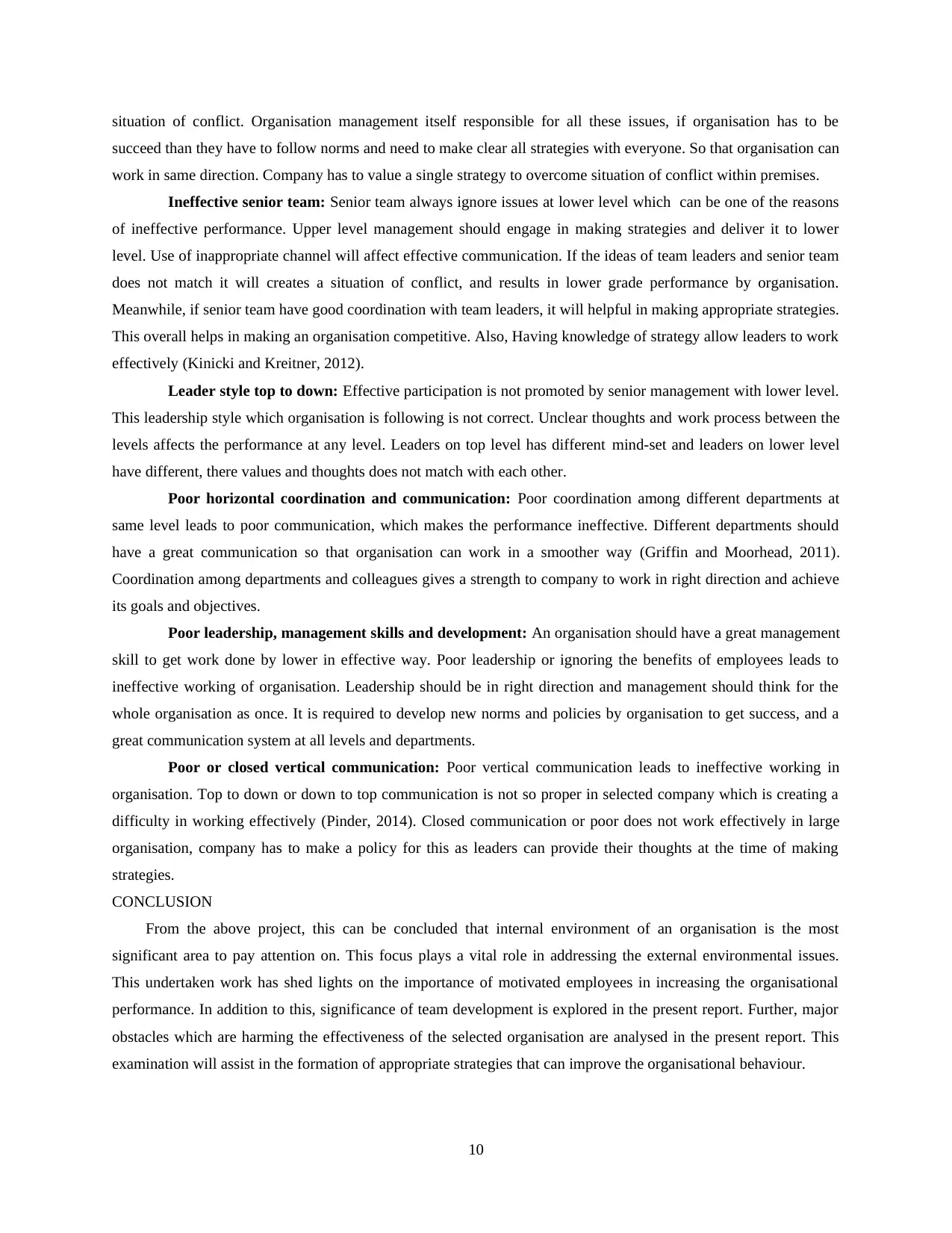
situation of conflict. Organisation management itself responsible for all these issues, if organisation has to be
succeed than they have to follow norms and need to make clear all strategies with everyone. So that organisation can
work in same direction. Company has to value a single strategy to overcome situation of conflict within premises.
Ineffective senior team: Senior team always ignore issues at lower level which can be one of the reasons
of ineffective performance. Upper level management should engage in making strategies and deliver it to lower
level. Use of inappropriate channel will affect effective communication. If the ideas of team leaders and senior team
does not match it will creates a situation of conflict, and results in lower grade performance by organisation.
Meanwhile, if senior team have good coordination with team leaders, it will helpful in making appropriate strategies.
This overall helps in making an organisation competitive. Also, Having knowledge of strategy allow leaders to work
effectively (Kinicki and Kreitner, 2012).
Leader style top to down: Effective participation is not promoted by senior management with lower level.
This leadership style which organisation is following is not correct. Unclear thoughts and work process between the
levels affects the performance at any level. Leaders on top level has different mind-set and leaders on lower level
have different, there values and thoughts does not match with each other.
Poor horizontal coordination and communication: Poor coordination among different departments at
same level leads to poor communication, which makes the performance ineffective. Different departments should
have a great communication so that organisation can work in a smoother way (Griffin and Moorhead, 2011).
Coordination among departments and colleagues gives a strength to company to work in right direction and achieve
its goals and objectives.
Poor leadership, management skills and development: An organisation should have a great management
skill to get work done by lower in effective way. Poor leadership or ignoring the benefits of employees leads to
ineffective working of organisation. Leadership should be in right direction and management should think for the
whole organisation as once. It is required to develop new norms and policies by organisation to get success, and a
great communication system at all levels and departments.
Poor or closed vertical communication: Poor vertical communication leads to ineffective working in
organisation. Top to down or down to top communication is not so proper in selected company which is creating a
difficulty in working effectively (Pinder, 2014). Closed communication or poor does not work effectively in large
organisation, company has to make a policy for this as leaders can provide their thoughts at the time of making
strategies.
CONCLUSION
From the above project, this can be concluded that internal environment of an organisation is the most
significant area to pay attention on. This focus plays a vital role in addressing the external environmental issues.
This undertaken work has shed lights on the importance of motivated employees in increasing the organisational
performance. In addition to this, significance of team development is explored in the present report. Further, major
obstacles which are harming the effectiveness of the selected organisation are analysed in the present report. This
examination will assist in the formation of appropriate strategies that can improve the organisational behaviour.
10
succeed than they have to follow norms and need to make clear all strategies with everyone. So that organisation can
work in same direction. Company has to value a single strategy to overcome situation of conflict within premises.
Ineffective senior team: Senior team always ignore issues at lower level which can be one of the reasons
of ineffective performance. Upper level management should engage in making strategies and deliver it to lower
level. Use of inappropriate channel will affect effective communication. If the ideas of team leaders and senior team
does not match it will creates a situation of conflict, and results in lower grade performance by organisation.
Meanwhile, if senior team have good coordination with team leaders, it will helpful in making appropriate strategies.
This overall helps in making an organisation competitive. Also, Having knowledge of strategy allow leaders to work
effectively (Kinicki and Kreitner, 2012).
Leader style top to down: Effective participation is not promoted by senior management with lower level.
This leadership style which organisation is following is not correct. Unclear thoughts and work process between the
levels affects the performance at any level. Leaders on top level has different mind-set and leaders on lower level
have different, there values and thoughts does not match with each other.
Poor horizontal coordination and communication: Poor coordination among different departments at
same level leads to poor communication, which makes the performance ineffective. Different departments should
have a great communication so that organisation can work in a smoother way (Griffin and Moorhead, 2011).
Coordination among departments and colleagues gives a strength to company to work in right direction and achieve
its goals and objectives.
Poor leadership, management skills and development: An organisation should have a great management
skill to get work done by lower in effective way. Poor leadership or ignoring the benefits of employees leads to
ineffective working of organisation. Leadership should be in right direction and management should think for the
whole organisation as once. It is required to develop new norms and policies by organisation to get success, and a
great communication system at all levels and departments.
Poor or closed vertical communication: Poor vertical communication leads to ineffective working in
organisation. Top to down or down to top communication is not so proper in selected company which is creating a
difficulty in working effectively (Pinder, 2014). Closed communication or poor does not work effectively in large
organisation, company has to make a policy for this as leaders can provide their thoughts at the time of making
strategies.
CONCLUSION
From the above project, this can be concluded that internal environment of an organisation is the most
significant area to pay attention on. This focus plays a vital role in addressing the external environmental issues.
This undertaken work has shed lights on the importance of motivated employees in increasing the organisational
performance. In addition to this, significance of team development is explored in the present report. Further, major
obstacles which are harming the effectiveness of the selected organisation are analysed in the present report. This
examination will assist in the formation of appropriate strategies that can improve the organisational behaviour.
10
Paraphrase This Document
Need a fresh take? Get an instant paraphrase of this document with our AI Paraphraser
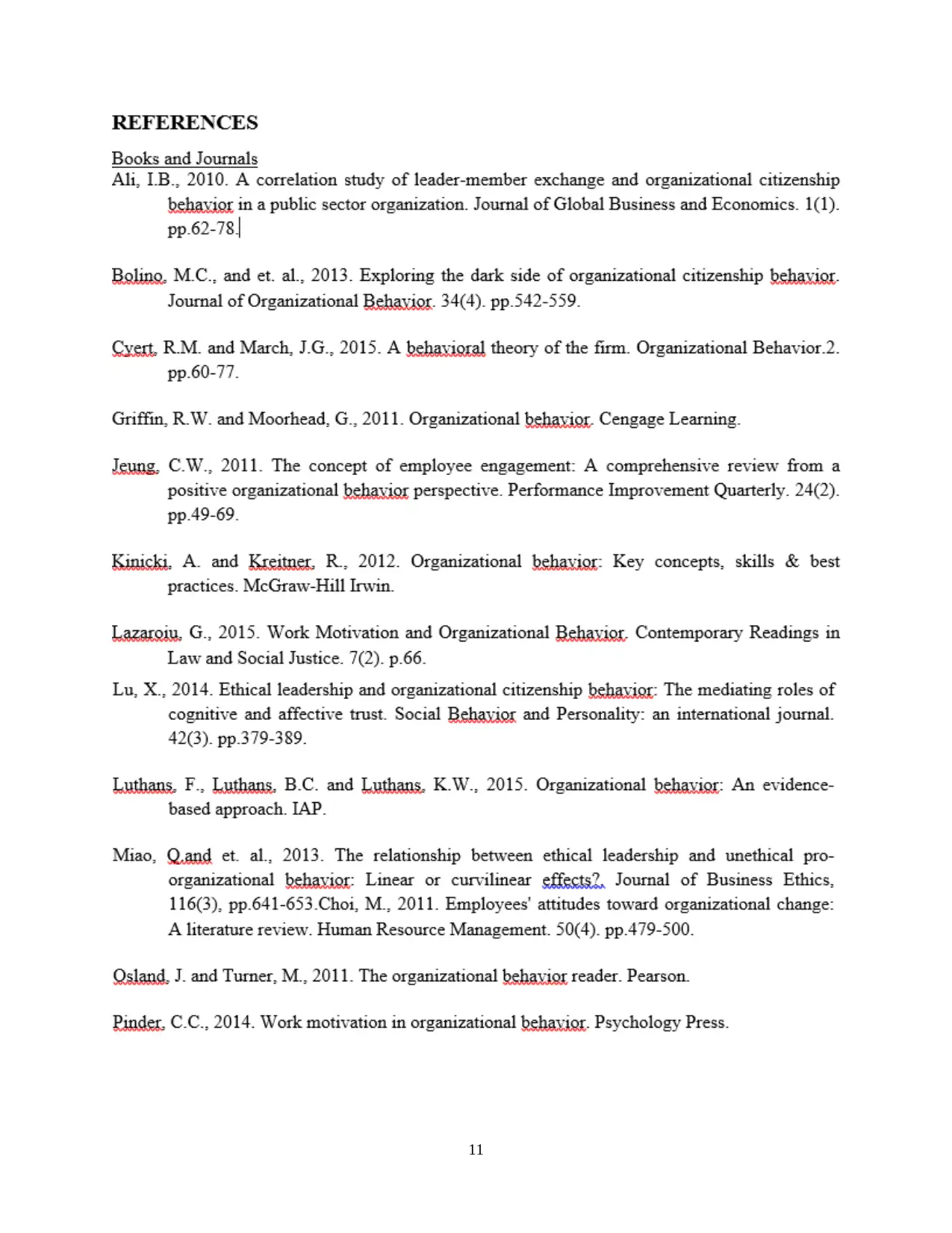
11
1 out of 11
Related Documents
Your All-in-One AI-Powered Toolkit for Academic Success.
+13062052269
info@desklib.com
Available 24*7 on WhatsApp / Email
![[object Object]](/_next/static/media/star-bottom.7253800d.svg)
Unlock your academic potential
Copyright © 2020–2026 A2Z Services. All Rights Reserved. Developed and managed by ZUCOL.





